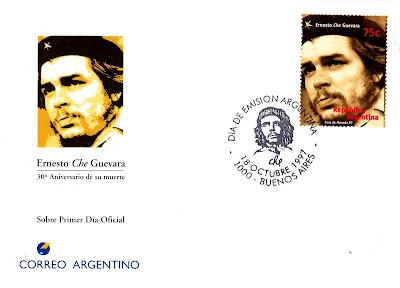CORREOS ARGENTINA on 9 October 1997 issued a 30th anniversary stamp marking the death of Ernesto Che Guevara. Hundreds of people purchased some 18,000 stamps, whose value was 75 cents. The first day cover sold out on the first day of sale. Although Guevera was a native son of Argentina, his image was prohibited in this South American nation in the previous decades.
Dr. Ernesto "Che" Guevara (1928 - 1967) was an Argentine Marxist revolutionary, physician, author, guerrilla leader, diplomat, and military theorist. He is one of history's more revered and reviled historical figures, depending largely on one's political perspective. His conflicting actions also contribute to the controversy. After the Cuban Revolution, of which he was a key proponent, Guevara performed a number of key roles in the new government. These included reviewing the appeals and firing squads for those convicted as war criminals during the revolutionary tribunals, instituting agrarian land reform as minister of industries, helping spearhead a successful nationwide literacy campaign, serving as both national bank president and instructional director for Cuba's armed forces, and traversing the globe as a diplomat on behalf of Cuban socialism. Such positions also allowed him to play a central role in training the militia forces who repelled the Bay of Pigs Invasion, and bringing Soviet nuclear-armed ballistic missiles to Cuba, which preceded the 1962 Cuban Missile Crisis. Additionally, Guevara was a prolific writer and diarist, composing a seminal guerrilla warfare manual, along with a best-selling memoir about his youthful continental motorcycle journey. His experiences and studying of Marxism–Leninism led him to posit that the Third World's underdevelopment and dependence was an intrinsic result of imperialism, neocolonialism, and monopoly capitalism, with the only remedy being proletarian internationalism and world revolution.
As a result of his perceived martyrdom, poetic invocations for class struggle, and desire to create the consciousness of a "new man" driven by moral rather than material incentives, Guevara has evolved into a quintessential icon of various leftist movements. In contrast, his ideological critics on the right accuse him of promoting authoritarianism and endorsing violence against his political opponents. Despite disagreements on his legacy, Time magazine named him one of the 100 most influential people of the 20th century.
Eventually, in early October 1967, Guevara was captured and executed in Bolivia. A Cuban exile turned CIA Special Activities Division operative, advised Bolivian troops during the hunt for Guevara in Bolivia. An informant apprised the Bolivian Special Forces of the location of Guevara's guerrilla encampment in the Yuro ravine. He was sick, wounded and imprisoned, then executed a few days later by firing squad on 9 October 1967.
Personally, and to a certain extent, I can empathise with Ernesto Che Guevara. There is and was much social injustice that needs(ed) to be righted in this world. Capitalism -- and Marxist Communism -- can be both forces for constructive change; but, as so often has been the case, certain individuals who may have had the sincerest intentions to correct those wrongs eventually become part of the problem and perverted the ideology they espoused. Che Guevara was no different. He recognised, or so he believed, what those socioeconomic ills were, subscribing to Marxist revolution as the force for change. He however could be ruthless and uncompromising, and this perhaps more than anything else contributed to his downfall. Still, he remains a legend...an iconic role model for socioeconomic justice in many parts of the world.


No comments:
Post a Comment